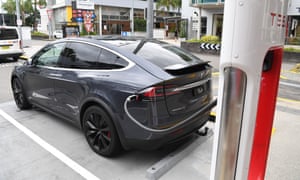Extract from The Guardian
Environment
New government analysis on electric vehicles suggests Labor’s
election policy was not out of step with path country is already on
Half the new cars sold in Australia in 2035 will be electric vehicles
even if there is no policy support to drive change, a new government
analysis forecasts.
It will reinforce the expert view that Labor’s election pledge to set a target of 50% new car sales being electric by 2030 would not have been that significant a shift from a path the country is already on.
Labor’s commitment prompted the prime minister, Scott Morrison, to accuse the opposition of wanting to “end the weekend” by forcing people out of four-wheel drives and the minister for small business, Michaelia Cash, to tell tradies only the Coalition would “save their utes”.
The government has said it will introduce a national electric vehicle
strategy to cut carbon dioxide emissions by 10m tonnes by 2030, but is
yet to release details.It will reinforce the expert view that Labor’s election pledge to set a target of 50% new car sales being electric by 2030 would not have been that significant a shift from a path the country is already on.
Labor’s commitment prompted the prime minister, Scott Morrison, to accuse the opposition of wanting to “end the weekend” by forcing people out of four-wheel drives and the minister for small business, Michaelia Cash, to tell tradies only the Coalition would “save their utes”.
A report published by the government’s Bureau of Infrastructure, Transport and Regional Economies examines the uptake of electric vehicles in 22 countries. It found sales vary between nations but are expected to grow rapidly across the world in coming decades.
Modelling suggests the electric vehicle share of new car sales in Australia will rise from about 0.34% today to 8% in 2025. It is predicted to then leap to 27% of new car sales in 2030 and 50% in 2035 as prices of electric car technology fall.
Behyad Jafari, chief executive of industry group the Electric Vehicle Council, said the report showed the transition to electric vehicles would happen “no matter what” and Australia would not need to do much to accelerate a local industry.
“As this report shows, the destination for Australia is pre-determined. The choice is how much value and benefit we capture in getting there,” he said.
“Globally, there is some $US300bn being invested in the EV sector. Surely Australia should be getting a piece of the action.”
The report says battery cost is expected to more than halve by 2025 and continue to decline, but battery size and vehicle range would both increase to more than double by mid next decade before peaking.
“This means that the outlook is for a fairly constant battery price for EVs out to 2025, before the price starts to decline,” the report says. It says a similar trajectory is expected for other manufacturing related costs.
The infrastructure and transport department said the report set out what would be expected under existing policy settings and did not assume any additional government support, but noted some government agencies invested in electric vehicle infrastructure.
A department spokeswoman said electric car uptake in Australia was slow compared with some of the countries examined. She said there would be a rapid change in new car sales once the technology became price competitive, but it would take some time for that to be fully reflected on Australian roads.
“There is usually a 10-15 year lag between new vehicle sales numbers and overall fleet numbers, so EVs are not expected to be a significant part of the passenger vehicle fleet until well into the 2030s,” the spokeswoman said.
The latest report is separate to government modelling discussed in Senate estimates in April. Environment department officials said they also had data prepared by consulting firm Energeia that suggested electric cars would account for 25-50% of new sales by 2030.
The government has committed $400,000 to develop its national electric vehicle strategy. It is expected next year.
It considered introducing the same vehicle emission standard proposed by Labor, requiring light cars to emit an average 105 grams of CO2 per kilometre, and received advice it would result in a net economic benefit, but decided against introducing the policy.
Treasurer Josh Frydenberg last year compared the expected trajectory of EVs to that of the iPhone. He said changes in battery technology and recharging infrastructure were gaining momentum in Europe, Asia and North America and would inevitably be replicated in Australia, and predicted people who mocked EVs would one day be driving them.

No comments:
Post a Comment